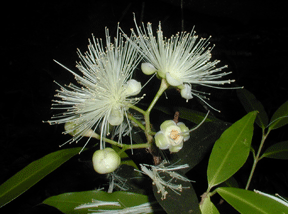Skip to content
Syzygium jambos
 PLANT NAME: Syzygium jambos (L.) Alston.
PLANT NAME: Syzygium jambos (L.) Alston.
OTHER NAMES: Eugenia jambos, E. vulgaris, Jambosa jambos, J. vulgaris.
COMMON NAMES: ‘Öhi’a loke (“rose ‘öhi’a”) [Hawai’i]; rose apple, malabar plum, malay apple [English]; pu tao [China]; ahi’a popa’a [French Polynesia]; fekika papalangi [Tonga]; iouen wai, youenwai, apel en wai [Pohnpei]; jambosier, pommier rose [French]; kavika, kavika ni vavalangi, kavika ni india [Fiji]; pomme rose [Caribbean]; thulo jamun [Nepal]; pomarrosa [Spanish]; manzanito de rosa [Colombia].
FAMILY: Myrtaceae.
CATEGORY: Stabilize and bind (fruit, root bark) ~.
PROPERTIES: Undetermined. The fruit peel is said to be sweet, sour and hot.
PLANT PART USED: Bark, root bark, fruit, seeds.
PREPARATION OF MEDICINE: Bark infused or decocted.
WESTERN FUNCTIONS REPORTED: Antimicrobial; astringent; antiseptic~; hemostatic; hypoglycemic.
USE AS FOOD: Rose apple tastes the way a rose smells. It is sweet and quite delicious. Can be eaten raw or made into preserves and jellies. Small amounts only as large amounts of tannins may be harmful, though the fruit contains much less than the bark.
OTHER USES: Bark is made into a brown dye. Used for erosion control, firewood, and as a windbreak. The distilled fruit has been made into “rosewater.”
RANGE: Throughout Micronesia and Polynesia, Hawai’i, East Indies, & Malaya. Prehistoric introduction occurred through Southeast Asia, and more recently to Jamaica. First brought to Hawai’i from Rio de Janeiro in 1825 on the frigate “Blond.”
HABITAT: Likes it shady and moist. Apparently gravity carries the seeds downhill and rats (& humans) carry them uphill. Supposedly it grows to 3500 feet on tropical islands and up to 6000 feet in Ecuador, but I’ve never seen it above 1200 feet or so.
RESEARCH:
Water and acetone extractions are antimicrobial due to tannins. They are effective in vitro against numerous Staphylococci, and also against Yersinia enterocolitica [Djipa 2000].
TOXICITY: The bark has very high tannin content, 77% in water extractions.
CAUTIONS AND CONTRAINDICATIONS: Caution in constipation.
ENERGETIC CAUTIONS: Caution with damp stagnation, heat stagnation or in exterior conditions ~.
NOTES ‘N QUOTES
-
Rose apple may be the legendary “gambu” or “jambu” tree of India that produced fruit of immortality. The seeds were said to produce gold and the fruit juice created the river Gambu. The Buddha is sometimes shown under a rose apple tree.
-
The myrtaceae plant family often embodies extremes, and ‘öhi’a loke is no exception. The strong astringency of the bark is counterbalanced with the powerful and delicious sweetness of the fruit. It is usually an afterthought as a medicinal plant, but can be quite useful in an acute digestive disturbance. Given the alien impact of the plant, it is always a mixed blessing to come across a fruiting ‘öhi’a loke in the forest while gathering. The Chinese uses of the fruit peel are intriguing, and warrant further investigation.

 PLANT NAME: Syzygium jambos (L.) Alston.
PLANT NAME: Syzygium jambos (L.) Alston.
